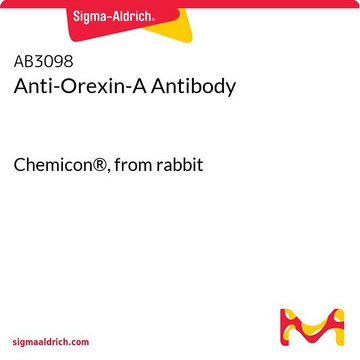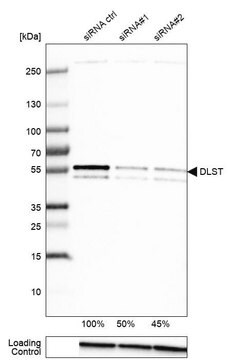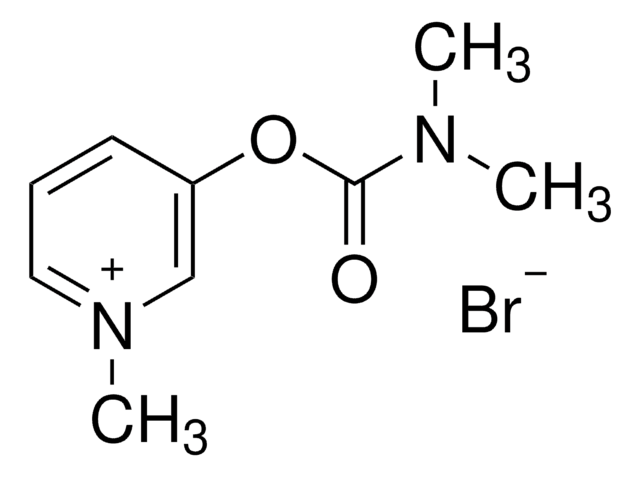MABC1709
Anti-Carcinoma Glycans Antibody, clone mAB-A4
clone mAb-A4, from mouse
Sinônimo(s):
Cancer Cell Glycans
Faça loginpara ver os preços organizacionais e de contrato
About This Item
Código UNSPSC:
12352203
NACRES:
NA.41
Produtos recomendados
fonte biológica
mouse
clone
mAb-A4, monoclonal
reatividade de espécies
human
técnica(s)
flow cytometry: suitable
immunohistochemistry: suitable
immunoprecipitation (IP): suitable
western blot: suitable
Isotipo
IgMκ
temperatura de armazenamento
2-8°C
modificação pós-traducional do alvo
unmodified
Descrição geral
Cancer cells contain distinctive glycan structures on their cell surface and their presence on glycoproteins or glycolipids can play a functional role in cancer progression. They are also important targets for cancer therapy. They can be targeted by monoclonal antibodies for detection and intervention. Clone mAb-A4 is shown to specifically bind only to glycans in breast, ovary, testis, lung, pancreas, bone and small intestine cancer cells, but not to benign cells in these tissues. Hence, it can be a useful tool to distinguish between malignant and benign cells. This antibody targets primarily N-linked glycans and bind to H-type I antigen (Fuc-alpha1,2-Gal-beta1,3-GlcNAc), with secondary binding to type I LacNAc. Removal of N-glycans, but not sialic acid, from the antigen using PNGaseF is shown to abolish the binding of this antibody. These antigens are also found to be pluripotency-associated antigens on human embryonic stem cells (hESC). This clone is shown to have a direct cytotoxic effect against hESC and SKOV3 ovarian cancer cells and cause significant reduction in their viability. (Ref.: Liau, B., et al. (2017). Sci. Rep. 7; 14489; Choo, M., et al. (2017). J. Biol. Chem. 292(15); 6163-6176).
Especificidade
Clone mAb-A4 detects ovarian and breast cancer cells and targets H Type 1 glycans.
Imunogênio
Live HES-3 human embryonic stem cells.
Aplicação
Immunoprecipitation Analysis: A representative lot immunoprecipitated Carcinoma Glycans in Immunoprecipitation applications (Choo, M., et. al. (2017). J Biol Chem. 292(15):6163-6176).Immunohistochemistry Analysis: A representative lot detected Carcinoma Glycans in Immunohistochemistry applications (Choo, M., et. al. (2017). J Biol Chem. 292(15):6163-6176).Flow Cytometry Analysis: A representative lot detected Carcinoma Glycans in Flow Cytometry applications (Liau, B., et. al. (2017). Sci Rep. 7(1):14489; Choo, M., et. al. (2017). J Biol Chem. 292(15):6163-6176).Western Blotting Analysis: A representative lot detected Carcinoma Glycans in Western Blotting applications (Liau, B., et. al. (2017). Sci Rep. 7(1):14489; Choo, M., et. al. (2017). J Biol Chem. 292(15):6163-6176).
Qualidade
Evaluated by Flow Cytometry in BT-474 human breast carcinoma cells.Flow Cytometry Analysis: 1 µg of this antibody detected Carcinoma Glycans in one million BT-474 human breast carcinoma cells.
forma física
Purified mouse monoclonal antibody IgM in buffer containing 0.1 M Tris-Glycine (pH 7.4), 150 mM NaCl with 0.05% sodium azide.
Format: Purified
Purification Method: Protein G purified
Format: Purified
Purification Method: Protein G purified
Armazenamento e estabilidade
Stable for 1 year at 2-8°C from date of receipt.
Outras notas
Concentration: Please refer to lot specific datasheet.
Exoneração de responsabilidade
Unless otherwise stated in our catalog or other company documentation accompanying the product(s), our products are intended for research use only and are not to be used for any other purpose, which includes but is not limited to, unauthorized commercial uses, in vitro diagnostic uses, ex vivo or in vivo therapeutic uses or any type of consumption or application to humans or animals.
Certificados de análise (COA)
Busque Certificados de análise (COA) digitando o Número do Lote do produto. Os números de lote e remessa podem ser encontrados no rótulo de um produto após a palavra “Lot” ou “Batch”.
Já possui este produto?
Encontre a documentação dos produtos que você adquiriu recentemente na biblioteca de documentos.
Nossa equipe de cientistas tem experiência em todas as áreas de pesquisa, incluindo Life Sciences, ciência de materiais, síntese química, cromatografia, química analítica e muitas outras.
Entre em contato com a assistência técnica






